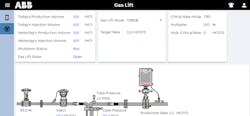The Internet might indeed be a democratizing force, but the Industrial Internet of Things (IIoT) has too often been seen as only truly attainable by the rich and powerful. Behemoths like Shell or BP might be able to launch their wide-reaching digitalization projects, but how realistic are IIoT ambitions for smaller oil and gas startups?
At this year’s ABB Customer World in Houston, ABB launched a cloud-based visualization system that makes it as easy for smaller operators to gain insights about their onshore upstream assets as it is for the big guys. ABB Ability Wellhead Manager—in principle, a supervisory control and data acquisition (SCADA) system in the cloud—can scale easily and enable insights about production assets from anywhere in the world.
The new system not only makes it easier for small startups to get the information they need without having to launch a full-blown SCADA system, it gives even large operators the ability to more easily integrate newly acquired wells. “This makes sense for somebody acquiring 100-1,000 wells and who wants to put a monitoring system in place,” said Martin Grady, senior vice president for oil, gas and chemicals at ABB. The Wellhead Manager is a web-based subscription service in the form of a light, simple application, he added. “Then our analytical package can bring a lot of richness, extracting full value from a limited number of data points.”
Even as oil companies acquire more wells, they do not have to be faced with sending an operator out to the field all the time just to read data, added Nathan Tungseth, global product group manager for onshore oil and gas at ABB. “They don’t have to have a new SCADA system every time they buy 100 wells,” he added. Remote workers can connect in real time, visualizing information on smartphones, tablets or computers, where they can also plug into additional digital applications such as enhanced oil recovery or predictive analytics, he said.
It’s a relatively agnostic system as well. “It doesn’t have to be our system out there all the time that they have,” he said. “It could sit on top of other people’s SCADA systems.”
By providing immediate access to data, alarms and call out notifications, ABB Ability Wellhead Manager reduces downtime and risk. Operators can proactively prevent issues, predict productivity and easily scale up or down as necessary. The system also supports better decision-making, with field production data digitally gathered and visualized using a web application. It includes clear dashboards, insights and analytics.
Because Wellhead Manager is a subscription service, oil and gas operators can get the intelligent data they need to enhance efficiencies and increase production without having to make the capital expenditure that they would for a full-blown SCADA system. Operators can give their attention to the most inefficient well sites, zeroing in on those that aren’t producing, Tungseth noted.
ABB Ability Wellhead Manager was developed initially for the North American market, Tungseth said, and then ABB has been exploring how it might be used in other parts of the world as well. “It’s running now on roughly 1,000 wells out there,” he said. “Now it’s ready more for prime time.” ABB continues to add new applications, including plugging advanced analytics from partner companies into ABB’s tool, he added.
YPF, Argentina’s state-controlled oil company, has Wellhead Manager running on about 17,000 wells, Tungseth noted. “The beauty of this is it’s completely scalable—whether it’s 10 wells or 17,000.”
ABB offers on-premise SCADA, but there are plenty of situations in which oil and gas operators might not want to go that route. They might have acquired new wells, with a SCADA system they want to replace, Grady noted. Or they might have a 20-year-old SCADA system but want to move to digital technology, Tungseth added. “With this, it allows you the flexibility to integrate into existing systems.”
When a well is nearing the end of its operating life is another good use case. Rather than shutting in the well, which is expensive, they could flow it just once or twice a year, keeping it an operating well, Tungseth explained. With the Wellhead Manager, they would only pay for SCADA when they use it.
“The value proposition is you don’t have to spend money on a new SCADA system,” Grady said. “You can try having some data without having to invest."
Leaders relevant to this article:

